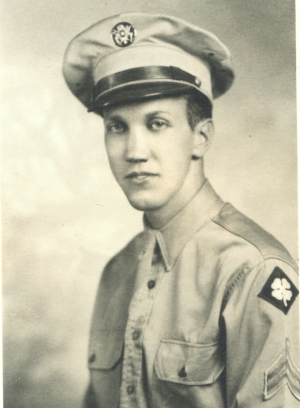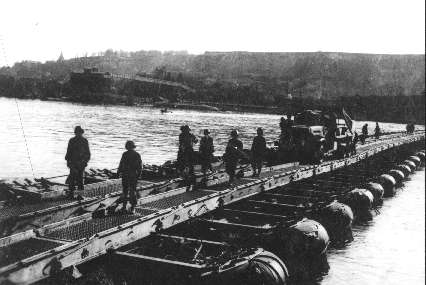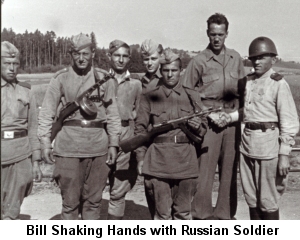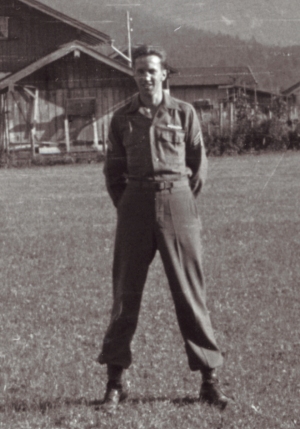Bill Cavanaugh 3rd Army 65th Infantry Division
By Dan Cavanaugh
 We landed in LaHaurve, France and we had to cross into Germany right before the Siegfried Line. Did you ever hear about that? It’s a big fortification that the French built after World War I with the intention that Germany could never again fight there way into France. Well they were dreaming because at that time they didn’t think about the number of airplanes that would be involved. In WWI airplanes were very scarce. But when the war came along with the tanks and airplanes Hitler made heck –he overran the French in a couple of days. The wall was 8 ft thick with cement and 60′ feet long. (40’x 40′ dimensions located at the top of a hill so they could shoot at someone coming up the hill.
We landed in LaHaurve, France and we had to cross into Germany right before the Siegfried Line. Did you ever hear about that? It’s a big fortification that the French built after World War I with the intention that Germany could never again fight there way into France. Well they were dreaming because at that time they didn’t think about the number of airplanes that would be involved. In WWI airplanes were very scarce. But when the war came along with the tanks and airplanes Hitler made heck –he overran the French in a couple of days. The wall was 8 ft thick with cement and 60′ feet long. (40’x 40′ dimensions located at the top of a hill so they could shoot at someone coming up the hill.
When we got ready to go up the hill to the Siegfried Line ‘They said to get ready now to charge a hill that was secured by pill boxes (concrete forts with gun openings). We said we could never shoot these big pillboxes, because they were as big as a room. Don’t make any difference you’re gonna go so we did – the Sergeant said you got to do it. Luckily only one or two fellows from our platoon got hurt and the other American company on the other side got banged up pretty good from the Germans in the pillboxes shooting at them. We moved out up the hill as a group and after the firefight in which several people were killed or hurt resistance dropped off. About that time our advancement started to take off and Germans were retreating and surrendering as fast as we could go. We were in firefight at part of the group, but our platoon wasn’t hit so we were lucky there.
We were there for a week to 10 days and we lived in a cellar downstairs-right at the dividing line between Germany and France. I don’t remember what side we were on. (Note: appears to be Sauerlautin, Germany). They would bring the supplies up the back and there was an alley one way crossing with another alley. It was a 20’ft alley that we had to run across carrying supplies and pretty soon, bang, bang, somebody shot at us. We had to go back and carry more supplies and each time we tried to make sure that nobody was there but you couldn’t see them. There was a sniper sitting somewhere waiting to shoot at us. We didn’t know where he was. So you picked up your supplies and ran and hopefully they wouldn’t hit you. We had a couple guys get hit; it was just a matter of whether your number came up or not. We were running one at a time, one of the soldiers got shot crossing behind me. Shorty got hit. Nobody was running to rescue him and the staff sergeant led the way and we got him.
We called it Burp Gun Alley. As a young kid it didn’t mean that much to you – not that it was a game – but you didn’t feel that you were going to get shot. A couple days later we were told to get ready to move out. We were behind one of these houses in the cellar and somebody noticed that a section of the wall had been put in recently. We took the wall out and found a storage room that was 6′ x 6’. They had put food in there for after the war – they figured to come back after the war they would have something to eat. But we ate it. It was canned goods like peaches, vegetables, etc (canned like Mom used to make). About 4 or 5 of us soldiers ate it – mostly fruits. That was more or less our home for two weeks.
Crossing the Rhine – one of the scariest times.
We were preparing to cross the Rhine River. We were traveling by truck and had stopped to rest because we had advanced to fast and our supplies couldn’t keep up with us. But they had the Germans on the run so they US kept pushing hard. We were in an open field and for our own protection we had to dig foxholes to protect from enemy shells. We couldn’t see them but we knew they were sitting over there because of the mortar shell shots landing around us. At first they were 3 football fields away – then they were maybe 4 or 5 yards away. The whistling shells came closer and closer then boom. We were out in the open with no place to go. Supplies did come again shortly, so we moved out and crossed the Rhine.
Let’s see were we crossed the Rhine, they used to put our platoon on patrol on the river there in one area. I was put with another Sergeant from another outfit and I didn’t know who he was at all, other then he was somebody from the American Army. And we were sent out as scouts to make sure everything was ok. We were walking down the road and I heard somebody coming because they were talking.
And I said to this other Sergeant we better challenge this guy that’s coming our way. He said Hell no I’m not going to challenge him. Boom. Boom. And he shot him. I asked him why in the hell he did that. He said you’re a rookie up here aren’t you. If you challenge somebody like that before you get a chance to say keep your hands up they’ll shoot you. So actually it’s either you or them and you’re taking a chance by saying anything.
Then when we to Stuttgart we went south of Stuttgart to Linz, Austria. When we were in Stuttgart we were traveling most of the time in daytime about 20 guys to a truck because the war was moving pretty fast, and the supplies were coming pretty fast after being held up for a while. We were getting gasoline and allot of stuff everyday, while Germany was losing more everyday because of the bombing. When we crossed the Danube to go into Linsk it was near the end of the war and the Germans we doing anything to stop us. They had a 90mm anti-aircraft gun that we were now using at us as we tried to cross. Captain said to hit the ground and dig holes. The firing stopped when we were out in the field – apparently the word had come down that the Germans had surrendered. Captain said don’t be too sure, don’t be cocky and get shot.
Castles and Wine 
I don’t know exactly where that was, but when our outfit came up to the Rhine River, there was still a bridge across it so it had to be southern Germany somewhere because most of the bridges were shot up by that time, and we stayed in a castle right on the Rhine that night, and somebody took a elevator, they had elevators in the castle, down to the basement and found a bunch of wine stored down there. So everybody had a good time drinking wine, but the next day they were a little sad because they had headaches. And later that night we had to get in the platoon boat and cross the Rhine River loaded down with our guns and ammo. We’d be in one of these big flat platoons boats that held 8-10 guys and most of those guys couldn’t swim but they could paddle, and I don’t recall that we lost anybody going over there but that was a swift river. You’d leave land on one side, by the time you got on shore on the other side you would be a 300-500 ft down the river because the river was awful fast.
The concentration camps.
(Historical Note: 260th armored was credited with liberating the Mauthausen concentration camp in Linz, Austria – but the 260th infantry arrived shortly afterward and were the guys who physically spent time at the camp investigating etc. The armored moved on.)
I was first through barracks – would be 2nd in platoon. Went in one end went straight through and then out the outside the side of barracks.
I think it was one of the first concentration camp built by the Nazis. We went thru barracks near Linz. Sergeant said do you want to be part of history. We were one of first GI’s to go into the barracks at this camp. I was up front in a platoon of 30 and we started walking through the barracks. The door to the barracks was like a sliding door on the railroad car – it opened by sliding it to one side. When we opened the door and started through man the smell of dead bodies was terrible. You started to run and hold your breath trying not to take another deep breath unless you absolutely needed to. You rushed through as fast as you could. They were about 100 ft long and you couldn’t wait to get through to the other end. We were the first American group to go into gashouses also. They had the prisoners take their clothes off and would put them in railroad cars and close the doors. They were sealed in and all of their exists were shut off. They had a slightly slanted railroad tracks bringing these railroad cars with people jammed into take them into gas chamber. These big doors opened up and they drove the cars in. They forced some people to walk into the chamber and then gassed all of them. They would then back out of the barn like door like it was regular freight train depot, drove the car to a ditch just kept throwing them (dead Jews) in the ditch. There was probably 300-400 ft of track and several tracks. The ditches were about 80-100ft long and about half as wide. They would have 300-500 people in it; it was a deep ditch, about 20 feet deep loaded with naked bodies. Then they would cover them with dirt from a bulldozer. And it started all over again – like a machine. Bad bad order made you sick. Odor sinks right into you. The odor was horrific. I will always remember that – the stink was so bad. Captain was furious at the German citizen’s. They lived less than 200 yards from the camps and yet claimed they knew nothing of them – they were afraid to be shot by the GI’s. He said to them – ‘You can’t tell me you damn liar that you can’t smell this – you better tell me the truth or I’ll shoot you anyway. Capt was tough on them but I don’t blame him. They still insisted they didn’t smell anything. Capt didn’t believe them. The German’s told him they couldn’t smell anything and he told them they were full of crap. On the one side of town a less than a mile from the camp, you could smell the stink. I think they were afraid for their lives. Letting off Steam
We found a motorcycle in the house that we stayed at one night in the garage. I took a ride on it down to the end of the street. This was the day the war was over so we didn’t want to stay out too long. In that same building is where you I got my P38 – in the bedroom dresser drawer. The house was vacated before we got there. We came into the city and people were afraid of Americans. And they were afraid that we were going to shoot them up and stuff so they scattered and got out of there as quick as they could. We only stayed a couple of nights. At one place we stopped one lady was crying to me that all her chairs were broken and it would take a lifetime to replace them. Some of the GI’s used the butts of their guns to break the chairs. She said it was because they were mean. I told here we were not being mean, but it was more a rebuttal against the enemy who had killed their buddies. They were in the territory of the enemy so they wanted to make a point. We all told her ‘You started the war, not us’. Outside of Linz we met up with the Russians. I traded a wristwatch to a Russian soldier for $100 bucks. Probably worth 30-40 dollars in the states. Don’t know what I did with the money. I remember sending Tom and Jim $100 bucks a piece as a gift. I always thought war would be different. Thought war would be more spread out than it was. You would be in your truck jump out and 30-40 guys were walking down the street – fight the guys in that town and then got back on the truck move onto the next town. Someone could be 10 blocks away you might not even know there was a war going on.
Purple heart
 For you to come back to the United States, everybody had to total up their shipment points, you got a purple heart if you got wounded or hurt some way, one of those two items. I didn’t get wounded in that sense, I had been under fire, but I got hurt trying to avoid something coming down the road. It was a bumpy road and I was trying to get away and get to level ground. We were coming down one side of the road and somebody was coming down the other side of the road – we didn’t know who it was. I turned my ankle and they sent me to back the hospital and I was there for 6 weeks. Things were sort of confused at that time during the war. I Was with 3rd Army, 65th Infantry division- they had us (wounded) barricaded behind a screened off fence because the didn’t want any association between the people and the troops so I was barricaded behind this prison fence for about 5 or 6 weeks. Then I they sent back to my infantry division and at that time they were in Linz, Austria. We stayed there another 3 weeks or so. That was the playground for the 3rd Army. Then we went south to where they had these big hotels that right against the base of a mountain where they had a golf range. We stayed there until we got shipped back to the States. As you accumulated points, I applied for some points for something, some points for something else and some points for the injury to the ankle. But it wasn’t as serious as if you’d been shot in the ankle then you would have gotten say maybe 4 points, but if you just hurt it you got 2 points. When you get 16 points, you got on a list of those ready to be shipped back to the states. And that’s how I got the Purple Heart. I probably wouldn’t have needed it accept that it gave me points to get back and everybody else was getting points the same way. The object was to get back because the war was over you see. War is Hell.
For you to come back to the United States, everybody had to total up their shipment points, you got a purple heart if you got wounded or hurt some way, one of those two items. I didn’t get wounded in that sense, I had been under fire, but I got hurt trying to avoid something coming down the road. It was a bumpy road and I was trying to get away and get to level ground. We were coming down one side of the road and somebody was coming down the other side of the road – we didn’t know who it was. I turned my ankle and they sent me to back the hospital and I was there for 6 weeks. Things were sort of confused at that time during the war. I Was with 3rd Army, 65th Infantry division- they had us (wounded) barricaded behind a screened off fence because the didn’t want any association between the people and the troops so I was barricaded behind this prison fence for about 5 or 6 weeks. Then I they sent back to my infantry division and at that time they were in Linz, Austria. We stayed there another 3 weeks or so. That was the playground for the 3rd Army. Then we went south to where they had these big hotels that right against the base of a mountain where they had a golf range. We stayed there until we got shipped back to the States. As you accumulated points, I applied for some points for something, some points for something else and some points for the injury to the ankle. But it wasn’t as serious as if you’d been shot in the ankle then you would have gotten say maybe 4 points, but if you just hurt it you got 2 points. When you get 16 points, you got on a list of those ready to be shipped back to the states. And that’s how I got the Purple Heart. I probably wouldn’t have needed it accept that it gave me points to get back and everybody else was getting points the same way. The object was to get back because the war was over you see. War is Hell.
A story told to Bill Second Hand: Some GI’s were advancing on a German town near the end of the war. There was one place and I forget the village it was in, and were weren’t too far from there either. It was near the end of the war when the American soldiers captured allot of Germans. The Germans were being guarded by Americans and were being moved forward. I heard it second hand. I don’t know if the GI’s were a little lax and they thought the German’s were unarmed but they weren’t cautious and they were attacked. War was almost over – I think there were a couple of straggler tanks etc. and some machine guns. Apparently it was coming up to get in a battle with somebody. Some other Germans surprised Americans and about 400-or 500 GI’s were killed. 2 or 3 in the back row didn’t get killed and told the story about the attack. There was about four, couple hundred GI’s and I know this from people I never saw, but other people that did see it told us. This German division lined the Americans up as prisoners of war because they captured them. They had them all standing there in the field then all of the sudden boom, boom, guns started firing guns. Probably what happened was some nut there for the Germans, maybe a machine gunner in the tank, said I’m going to shoot these sons of a B’s, so when he did the rest of them started shooting. There probably was only 10 or maybe less of the 400 Americans who escaped, that weren’t shot. War is cruel.
On the trip to New Mexico – what are the chances?
We were driving on the way to New Mexico, pulled in to get some gas at a station in Iowa, a guy came out who was in my troop….that was a surprise. Now a days if that would happen the guy would probably say ‘Hey come on home for supper’. But we just said Hello and got back in the car after we talked, and that was that.
 Our World War II Veterans
Our World War II Veterans